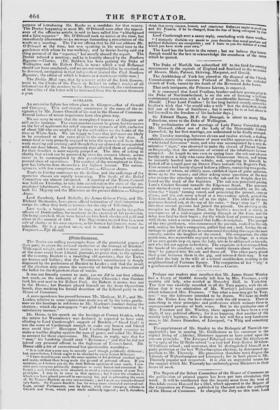alidrclIttnraug.
Thl Tories mire culhi hg paragraphs from all the provincial papers of their party to prove the nationaf exultation at the triumph of Burdett ! With equal weight, and far more justice, we might extract the notices of the billfIC event from Liberal journals, to prove that, in the opinion of the country, Burdett is a twaddling old apostate ; that the Tories are knaves und bullies; that the Westminster constituency is deeply disgraced by the pieference of Burdett to Leader ; and that the result of the election only proves the necessity of having the protection of the ballot for the dependent class of voters.
It was not literally correct to state, (as we did in our first edition last week, on the authority of the Morning Chroniele,) that Burdett took his seat next to Sir Robert Peel. Sir Robert, it seems, was not in the House ; but Burdett placed himself on the front Opposition bench, thus marking his formal desertion of the Liberal party in the House of Commons.
A correspondence has pnssed between Mr. 'Maclean, M.P., and Mr. Leader, relative to some expressions made use of by the latter gentle- man on the hustings in reference to Mr. Maclean's conduct during the election ; which the newspapers " are glad to bear S' terminated 1mm " a satisfactory manner."
Mr. Hume, in his speech on the hustings at Covent Garden, when the return fur Westminster was declared, is reported to have said, alluding to Lord Castlereagh's support of Burdett—" Good God ! is not the nnme of Castlereagh enough to make any honest and liberal man avoid him ?" Hereupon Lord Costlereagh found occasion to make a warlike display against the man of peace, and called Mr. Hume to account for these expressions. Mr. Hume, in reply, says that for " man," his Lordship should read " Reformer ; " mmmmd that lie did not intend any personal affront to the fugleman of Evans's hotel. Mr. Hume adds a bit of conventional but questionable morality— it is held that a nutn may be morally good though politically dishonest ; tut, nevertheless, I think ought to be shunned by every honest Reformer. " I have stated to your uncle the same opinion of his political conduct again and again, without their Iwing made the ground of personal offence. If you maintain, as I believe you do, the Anti. Retnrm opittions of your uncle, I con- sider your company politically dangerous to every honest anti consistent former ; and, therefore, to be shinnied, to avoid a contatrination of your Tiny principles. I may be in error iu that opinion ; but I view the situation in which you have placed yourself in canvassing for, and in advocating the cause of, Sir Francis Burdett, as very extraordinary ; and I made toy remarks thereof very freely. Sir Francis Burdett has for many years advocated universal suf- frage, annual Parliaments., vote by ballot, with other sweeping reforms in Ctisrch and State, which your uncle uniformly opposed ; and I, therefore, think that every sincere, honest, and consistent Reformer ought to avoid yot and Sir Francis, if he be changed, front the fear of being corrupted by yota company."
Lord Castlereagh sent a saucy reply, concluding with these words-- " I distinctly disclaim my assent to your doctrine that moral goofiness am! political dishonesty are compatible ; and I leave to you the defence of a creed which you have made your own."
The Lord has the better in the retort ; but we believe that honest Joseph would be the last to acknowledge the soundness of the canon which he quoted.


























 Previous page
Previous page